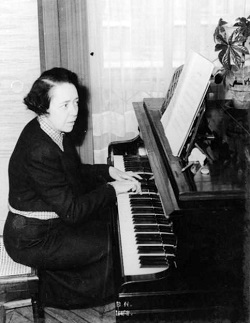Week 3: Programming historical women composers
Introduction
Reviewing the 1947 production of Jeanne Leleu [Tip: hold Ctrl and click a link to open it in a new tab. (Hide tip)] ’s ballet Nautéos in Monte Carlo, an anonymous music critic proclaimed in the French newspaper Le Monde that: ‘France possesses in Jeanne Leleu its most talented female composer’ (cited in Hamer, 2018, p. 83). Although not often performed today, Leleu was a highly regarded composer during the earlier twentieth century. She won France’s famous composition competition, the Prix de Rome in 1923, pursued a successful career as both a composer and a pianist, and taught at the Paris Conservatoire.
Far from being an exception, many women composers pursued active and successful careers in the past. As you learned in Week 1, many of their names and works are not currently well known, however, as they have been excluded from the musical canon, from musical education, and consequently from the classical music repertoire which is still most often performed today.
This week, you will consider how to go about programming works by historical women composers. This week is illustrated by a short interview with Tim Parker-Langston, founder of Hensel Songs Online, who discusses his work raising the profile of Fanny Hensel (born Mendelssohn), preparing new editions of her songs, and making these available to other performers for free.
By the end of this week, you should be able to:
- have an understanding of historical women composers and where you can start researching them and their music
- be aware of where you can find scores of works by historical women composers
- understand how you might go about creating new editions of unpublished works by historical women composers.

